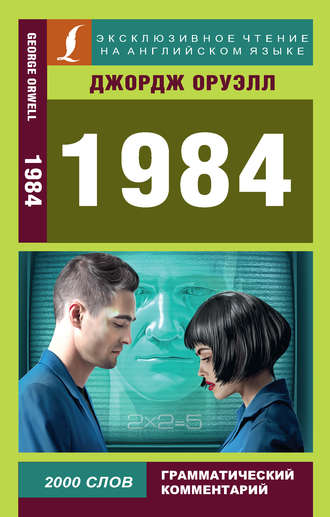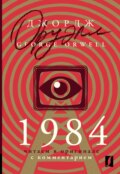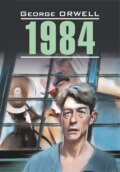
Джордж Оруэлл
1984
Chapter 2
As he put his hand to the door-knob Winston saw that he had left the diary open on the table. DOWN WITH BIG BROTHER was written all over it. It was an inconceivably stupid thing to have done. But, he realized, even in his panic he had not wanted to smudge the creamy paper by shutting the book while the ink was wet.
He drew in his breath and opened the door. A crushed-looking woman, with wispy hair and a lined face, was standing outside.
“Oh, comrade,” she began, “I thought I heard you come in. Do you think you could come across and have a look at our kitchen sink? It’s got blocked up and—”
It was Mrs Parsons, the wife of a neighbour on the same floor. She was a woman of about thirty, but looking much older. Winston followed her.
“Of course it’s only because Tom isn’t home,” said Mrs Parsons vaguely.
The Parsons’ flat was bigger than Winston’s, and dingy in a different way. Everything had a battered look. There were things laying all over the floor, and on the table there was a litter of dirty dishes. In another room someone was trying to keep tune with the military music which was still issuing from the telescreen.
“It’s the children,” said Mrs Parsons. “They haven’t been out today. And of course—”
She had a habit of breaking off her sentences in the middle.
Winston knelt down and examined the angle-joint of the pipe. Mrs Parsons looked on helplessly.
“Of course if Tom was home he’d put it right in a moment,” she said.
Parsons was Winston’s fellow-employee at the Ministry of Truth. He was a fattish but active man of paralyzing stupidity.
“Have you got a spanner?” said Winston.
“A spanner,” said Mrs Parsons. “I don’t know. Perhaps the children—”
There was a trampling of boots and children charged into the living-room. Mrs Parsons brought the spanner. Winston let out the water and disgustedly removed the clot of human hair that had blocked up the pipe. He cleaned his fingers as best he could in the cold water from the tap and went back into the other room.
“Up with your hands!” yelled a savage voice.
A tough-looking boy of nine had popped up from behind the table and was menacing him with a toy automatic pistol, while his small sister, about two years younger, made the same gesture with a fragment of wood.
“You’re a traitor!” yelled the boy. “You’re a thought-criminal! You’re a Eurasian spy! I’ll shoot you!”
Suddenly they were both leaping round him, shouting “Traitor!” and “Thought-criminal!”
Mrs Parsons’ eyes flitted nervously from Winston to the children, and back again.
“They do get so noisy,” she said. “They’re disappointed because they couldn’t go to see the hanging, that’s what it is. I’m too busy to take them and Tom won’t be back from work in time.”
“Why can’t we go and see the hanging?” roared the boy.
“Want to see the hanging! Want to see the hanging!” chanted the little girl.
Some Eurasian prisoners, guilty of war crimes, were to be hanged in the Park that evening, Winston remembered. This happened about once a month, and was a popular spectacle. Children always wanted to be taken to see it. He took his leave of Mrs Parsons and made for the door.
With those children, he thought, that wretched woman must lead a life of terror. Another year, two years, and they would be watching her night and day for symptoms of unorthodoxy. Nearly all children nowadays were horrible. They adored the Party and everything connected with it. It was almost normal for people over thirty to be frightened of their own children. And with good reason, for hardly a week passed in which “The Times” did not carry a paragraph describing how some eavesdropping little sneak—“child hero” was the phrase generally used—had overheard some compromising remark and denounced its parents to the Thought Police.
Once home, he picked up his pen half-heartedly, wondering whether he could find something more to write in the diary.
The voice from the telescreen paused. A trumpet call sounded. The voice continued raspingly:
“Attention! Your attention, please! A newsflash has this moment arrived from the Malabar front. Our forces in South India have won a glorious victory. I am authorized to say that the action we are now reporting may well bring the war within measurable distance of its end. Here is the newsflash—”
Bad news coming, thought Winston. And sure enough, soon came the announcement that, as from next week, the chocolate ration would be reduced from thirty grammes to twenty.
Winston belched again. The gin was wearing off. The telescreen—perhaps to celebrate the victory, perhaps to drown the memory of the lost chocolate—crashed into “Oceania, ‘tis for thee”.
Winston walked over to the window, keeping his back to the telescreen. The day was still cold and clear. Somewhere far away a rocket bomb exploded with a dull, reverberating roar. About twenty or thirty of them a week were falling on London at present.
He wondered again for whom he was writing the diary. For the future, for the past—for an age that might be imaginary.
The telescreen struck fourteen. He must leave in ten minutes. He had to be back at work by fourteen-thirty.
He went back to the table, dipped his pen, and wrote:
To the future or to the past, to a time when thought is free, when men are different from one another and do not live alone—to a time when truth exists and what is done cannot be undone: From the age of uniformity, from the age of solitude, from the age of Big Brother, from the age of doublethink—greetings!
He was already dead, he reflected. It seemed to him that it was only now, when he had begun to be able to formulate his thoughts, that he had taken the decisive step. The consequences of every act are included in the act itself. He wrote:
Thoughtcrime does not entail death: thoughtcrime IS death.
Now he had recognized himself as a dead man it became important to stay alive as long as possible. Two fingers of his right hand were inkstained. It was exactly the kind of detail that might betray you. He went to the bathroom and carefully scrubbed the ink away with the gritty darkbrown soap.
He put the diary away in the drawer. It was quite useless to think of hiding it, but he could at least make sure whether or not its existence had been discovered.
Chapter 3
Winston was dreaming of his mother.
He must, he thought, have been ten or eleven years old when his mother had disappeared. She was a tall, rather silent woman with slow movements and magnificent fair hair. His father he remembered more vaguely as dark and thin, dressed always in neat dark clothes and wearing spectacles. The two of them must have disappeared in one of the first great purges of the fifties.
At this moment his mother was sitting in some place deep down beneath him, with his young sister in her arms. Both of them were looking up at him. They were down in a place—the bottom of a well, or a very deep grave—which was moving downwards. They could still see him and he them. He was out in the light and air while they were being sucked down to death, and they were down there because he was up here. He knew it and they knew it.
He could not remember what had happened, but he knew in his dream that in some way the lives of his mother and his sister had been sacrificed to his own. The thing that now suddenly struck Winston was that his mother’s death, nearly thirty years ago, had been tragic and sorrowful in a way that was no longer possible. His mother’s memory tore at his heart because she had died loving him. Such a thing could not happen today. Today there were fear, hatred, and pain, but no dignity of emotion, no deep or complex sorrows.
Suddenly he was standing on short springy turf, on a summer evening. The landscape that he was looking at recurred so often in his dreams that he was never fully certain whether or not he had seen it in the real world. He called it the Golden Country. It was an old pasture.
The girl with dark hair was coming towards them across the field. With what seemed a single movement she tore off her clothes and flung them disdainfully aside. Her body was white and smooth, but it aroused no desire in him, indeed he barely looked at it. What overwhelmed him in that instant was admiration for the gesture with which she had thrown her clothes aside. That too was a gesture belonging to the ancient time. Winston woke up with the word “Shakespeare” on his lips.
The telescreen was giving forth an ear-splitting whistle which continued on the same note for thirty seconds. It was getting-up time for office workers. Winston got out of bed and seized a dingy singlet and a pair of shorts that were lying across a chair. The Physical Jerks would begin in three minutes.
“Thirty to forty group!” yelled a piercing female voice. “Thirty to forty group! Take your places, please. Thirties to forties!”
Winston stood in front of the telescreen, upon which the image of a youngish woman dressed in tunic and gym-shoes, had already appeared.
“Arms bending and stretching!” she rapped out. “Take your time by me. ONE, two, three, four! ONE, two, three, four! Come on, comrades, put a bit of life into it! ONE, two, three four! ONE two, three, four!…”
Winston mechanically shot his arms back and forth, with the look of grim enjoyment which was considered proper during the Physical Jerks. He was struggling to think his way backward into his early childhood. It was extraordinarily difficult. Beyond the late fifties everything faded. Everything had been different then. Even the names of countries, and their shapes on the map, had been different. Airstrip One, for instance, had not been so called in those days: it had been called England or Britain. Though London, he felt fairly certain, had always been called London.
Winston could not remember a time when his country had not been at war, but it was evident that there had been a fairly long interval of peace during his childhood, because one of his early memories was of an air raid which appeared to take everyone by surprise. Perhaps it was the time when the atomic bomb had fallen on Colchester. Since about that time, war had been literally continuous, though strictly speaking it had not always been the same war. At this moment, for example, in 1984 (if it was 1984), Oceania was at war with Eurasia and in alliance with Eastasia. Actually, as Winston well knew, it was only four years since Oceania had been at war with Eastasia and in alliance with Eurasia. But that was a piece of knowledge which he happened to possess because his memory was not satisfactorily under control. Officially the change of partners had never happened.
“Stand easy!” barked the instructress.
Winston slowly refilled his lungs with air. His mind slid away into the labyrinthine world of doublethink. To know and not to know, to be conscious of the truth while telling carefully constructed lies, to hold simultaneously two opinions, knowing them to be contradictory and believing in both of them,. That was the ultimate subtlety:. Even to understand the word “doublethink” involved the use of doublethink.
The instructress had called them to attention again. “And now let’s see which of us can touch our toes!” she said enthusiastically. “Right over from the hips, please, comrades. ONE-two! ONE-two!…”
Winston loathed this exercise, which sent shooting pains all the way from his heels to his buttocks and often ended by bringing on a coughing fit. The half-pleasant quality went out of his meditations. The past, he reflected, had not merely been altered, it had been actually destroyed. He tried to remember in what year he had first heard mention of Big Brother. He thought it must have been at some time in the sixties, but it was impossible to be certain. In the Party histories, of course, Big Brother figured as the leader and guardian of the Revolution since its very earliest days. Winston could not even remember at what date the Party itself had come into existence. Everything melted into mist. Sometimes, indeed, you could put your finger on a definite lie. It was not true, for example, as was claimed in the Party history books, that the Party had invented aeroplanes. He remembered aeroplanes since his earliest childhood. But you could prove nothing. There was never any evidence. And on that occasion—
“Smith!” screamed the voice from the telescreen. “6079 Smith W.! Yes, YOU! Bend lower, please! You can do better than that. You’re not trying. Lower, please! THAT’S better, comrade. Now stand at ease, the whole squad, and watch me.”
A sudden hot sweat had broken out all over Winston’s body. Never show dismay! Never show resentment! A single flicker of the eyes could give you away. He stood watching while the instructress raised her arms above her head, bent over and tucked the first joint of her fingers under her toes.
“THERE, comrades! THAT’S how I want to see you doing it. Watch me again. I’m thirty-nine and I’ve had four children. Now look.” She bent over again. “You see MY knees aren’t bent. You can all do it if you want to,” she added as she straightened herself up. “Anyone under forty-five is perfectly capable of touching his toes. Now try again. That’s better, comrade, that’s MUCH better,” she added encouragingly as Winston, with a violent lunge, succeeded in touching his toes with knees unbent, for the first time in several years.
Chapter 4
With the deep, unconscious sigh, Winston pulled the speakwrite towards him, blew the dust from its mouthpiece, and put on his spectacles. Then he unrolled and clipped together four small cylinders of paper which had already lopped out of the pneumatic tube on the right-hand side of his desk.
In the walls of the cubicle there were three orifices. To the right of the speakwrite, a small pneumatic tube for written messages, to the left, a larger one for newspapers; and in the side wall, within easy reach of Winston’s arm, a large oblong slit protected by a wire grating. This last was for the disposal of waste paper. Similar slits existed everywhere around the building, not only in every room but in every corridor. They were nicknamed memory holes. When one knew that any document was due for destruction, or even when one saw a scrap of waste paper lying about, it was an automatic action to lift the flap of the nearest memory hole and drop it in. A current of warm air would then bring it to one of the enormous furnaces somewhere within the building.
Winston examined the four slips of paper which he had unrolled. Each contained a message of only one or two lines—consisting largely of Newspeak words—which was used in the Ministry for internal purposes. They ran:
times 17.3.84 bb speech malreported africa rectify
times 19.12.83 forecasts 3 yp 4th quarter 83 misprints verify current issue
times 14.2.84 miniplenty malquoted chocolate rectify
times 3.12.83 reporting bb dayorder doubleplusungood refs unpersons rewrite fullwise upsub antefiling
With a faint feeling of satisfaction Winston laid the fourth message aside. It was an intricate and responsible job and had better be dealt with last. The other three were routine matters, though the second one would probably mean some tedious wading through lists of figures.
Winston dialled “back numbers” on the telescreen and the appropriate issues of “The Times” slid out of the pneumatic tube after only a few minutes’ delay. The messages he had received referred to articles or news items which for one reason or another it was thought necessary to alter, or, as the official phrase had it, to rectify. For example, it appeared from “The Times” of the seventeenth of March that Big Brother, in his speech of the previous day, had predicted that the South Indian front would remain quiet but that a Eurasian offensive would shortly be launched in North Africa. As it happened, the Eurasian Higher Command had launched its offensive in South India and left North Africa alone. It was therefore necessary to rewrite a paragraph of Big Brother’s speech, in such a way as to make him predict the thing that had actually happened.
As soon as Winston had dealt with each of the messages, he clipped his corrections to the appropriate copy of “The Times” and pushed them into the pneumatic tube. Then, he crumpled up the original message and any notes that he himself had made, and dropped them into the memory hole to be devoured by the flames.
He knew in general terms what would happen next. As soon as all the corrections had been assembled, that issue would be reprinted, the original copy destroyed, and the corrected copy placed on the files in its stead. This process of continuous alteration was applied not only to newspapers, but to books, periodicals, pamphlets, posters, leaflets, films, sound-tracks, cartoons, photographs—to every kind of literature or documentation which might hold any political or ideological significance. In this way every prediction made by the Party could be shown to have been correct, In no case would it have been possible, once the deed was done, to prove that any falsification had taken place. Even the written instructions which Winston received, and which he got rid of as soon as he had dealt with them, never stated or implied that an act of forgery was to be committed. It was always the reference to errors, misprints, or misquotations which it was necessary to put right in the interests of accuracy.
But actually, he thought, it was not even forgery. It was merely the substitution of one piece of nonsense for another. Most of the material that you were dealing with had no connexion with anything in the real world. Statistics were just a fantasy; a great deal of the time you were expected to make them up out of your head. For example, the Ministry of Plenty’s forecast had estimated the output of boots for the quarter at 145 million pairs. The actual output was given as sixty-two millions. Winston, however, in rewriting the forecast, brought the figure down to fifty-seven millions, to allow for the usual claim that the quota had been overfulfilled. And so it was with every class of recorded fact, great or small.
Winston glanced across the hall. In the corresponding cubicle on the other side a small man named Tillotson was working steadily away, with a folded newspaper on his knee and his mouth very close to the mouthpiece of the speakwrite. He had the air of trying to keep what he was saying a secret between himself and the telescreen. He looked up, and his spectacles darted a hostile flash in Winston’s direction.
Winston hardly knew Tillotson, and had no idea what work he was employed on. People in the Records Department did not readily talk about their jobs. In the long, windowless hall, with its double row of cubicles and its endless rustle of papers and hum of voices murmuring into speakwrites, there were quite a dozen people whom Winston did not even know by name, though he daily saw them hurrying to and fro in the corridors or gesticulating in the Two Minutes Hate. He knew that in the cubicle next to him the little woman with sandy hair was tracking down and deleting from the Press the names of people who had been vaporized and were therefore considered never to have existed. And a few cubicles away a mild, ineffectual, dreamy creature named Ampleforth, with very hairy ears and a surprising talent for juggling with rhymes and metres, was engaged in producing garbled versions—definitive texts, they were called—of poems which had become ideologically offensive, but which for one reason or another were to be retained in the anthologies. And this hall, with its fifty workers or thereabouts, was only one sub-sectionas it were, in the huge complexity of the Records Department. Beyond, above, below, were other swarms of workers engaged in a multitude of jobs: printing-shops with sub-editors, typography experts, the teleprogrammes section with its engineers, its producers, and its teams of actors. There were the armies of reference clerks whose job was make lists of books and periodicals due for recall. There were the vast repositories of corrected documents, and the hidden furnaces where the original copies were destroyed.
And the Records Department, after all, was itself only a single branch of the Ministry of Truth, whose primary job was not to supply the citizens of Oceania with newspapers, films, textbooks, telescreen programmes, plays, novels. Here were produced newspapers containing almost nothing except sport, crime and astrology, sensational five-cent novelettes, films oozing with sex, and sentimental songs which were composed entirely by mechanical means. There was even a whole section—Pornosec—engaged in producing the lowest kind of pornography.
Three messages had slid out of the pneumatic tube while Winston was working, but they were simple matters, and he had disposed of them before the Two Minutes Hate interrupted him. When the Hate was over he returned to his cubicle, took the Newspeak dictionary from the shelf, pushed the speakwrite to one side, cleaned his spectacles, and settled down to his main job of the morning.
Winston’s greatest pleasure in life was in his work. Most of it was a tedious routine, but included in it there were also jobs so difficult and intricate that you could lose yourself in them as in the depths of a mathematical problem—delicate pieces of forgery. Winston was good at this kind of thing.
Winston read through the article. Big Brother’s Order for the Day, was about praising the work of an organization known as FFCC, which supplied cigarettes and other comforts to the sailors. A certain Comrade Withers, a prominent member of the Inner Party, had been singled out for special mention and awarded a decoration, the Order of Conspicuous Merit, Second Class.
Three months later FFCC had suddenly been dissolved with no reasons given. Withers and his associates were now in disgrace, but there had been no report of the matter in the Press or on the telescreen. There was no clue as to what had happened to them.
Winston did not know why Withers had been disgraced. Perhaps it was for corruption or incompetence. Perhaps Big Brother was merely getting rid of a too-popular subordinate. Perhaps Withers or someone close to him had been suspected of heretical tendencies. Or perhaps—what was likeliest of all—the thing had simply happened because purges and vaporizations were a necessary part of the mechanics of government.
Winston thought for a moment, then pulled the speakwrite towards him and began dictating in Big Brother’s familiar style: a style at once military and pedantic, and, because of a trick of asking questions and then promptly answering them (“What lessons do we learn from this fact, comrades? The lesson—which is also one of the fundamental principles of Ingsoc—that,” etc., etc.), easy to imitate.






